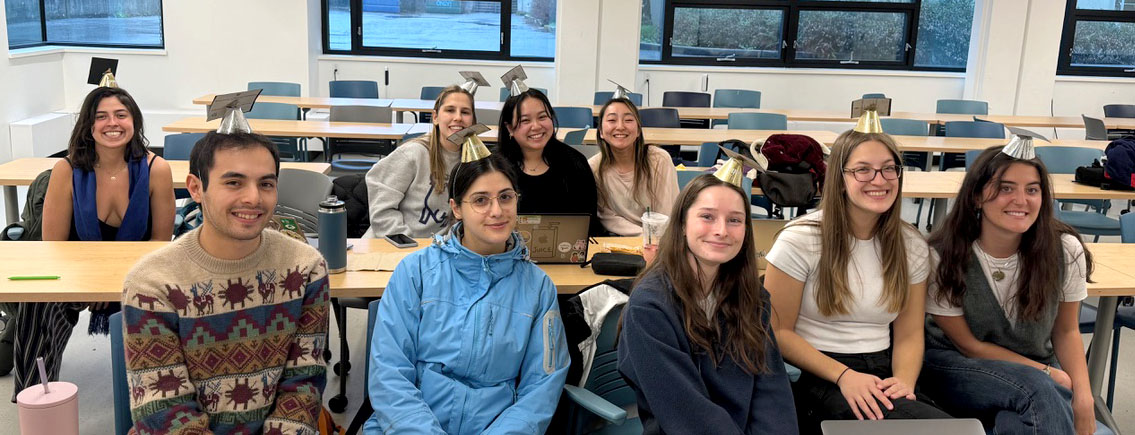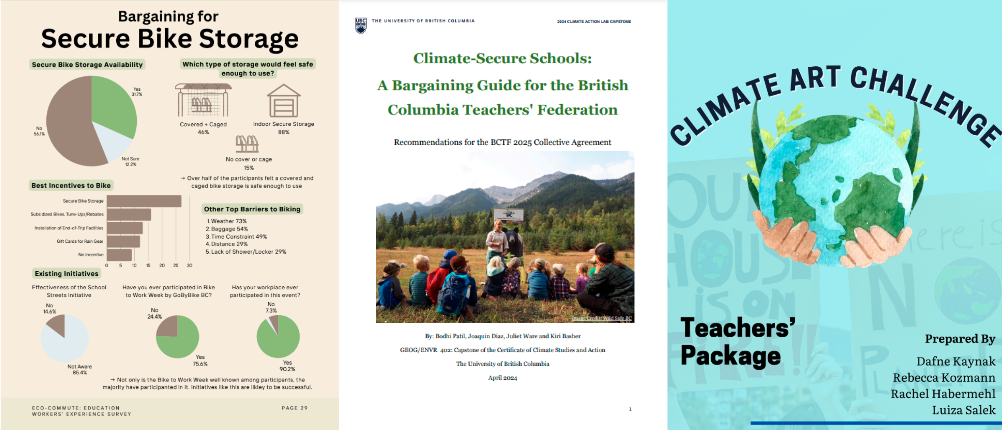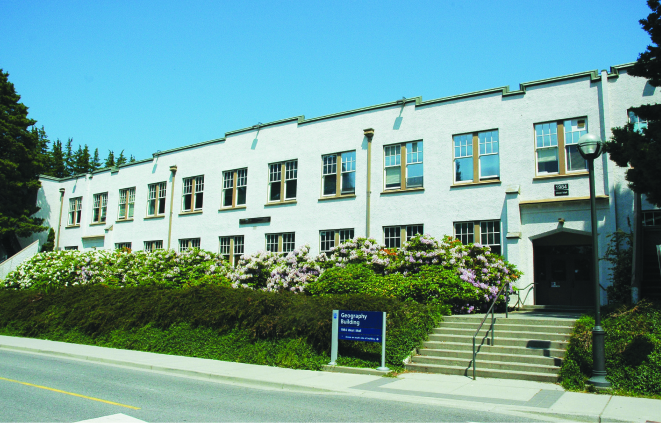Over the 2023/2024 term, the British Columbia Teachers’ Federation (BCTF), a labor union representing educators across BC, served as the community partner for UBC’s Climate Studies and Action Certificate program. The BCTF’s commitment to social and climate justice is underscored by its collaboration with 11 students on their capstone projects for the certificate program. Climate action challenges were posed to students by the BCTF during the Climate Action Lab in the fall of 2023. Students then developed solutions to these challenges, the proposed projects were vetted jointly by the BCTF and certificate instructors and project work got underway in January of 2024.


2023/2024 Capstone project students
The final three selected projects aimed to promote sustainable commuting, advance climate bargaining, and foster emotional and artistic engagement with environmental challenges related to climate change. Information about each project is listed below.


Transportation is a pivotal contributor to Canada’s greenhouse gas emissions, with daily commutes accounting for about half of the emissions. Education workers, whose commutes not only directly emit, but who also act as role models for younger generations, could help make a dent in that problem. Students designed a survey to explore the challenges public education workers in BC face when selecting environmentally friendly commuting options, with an emphasis on barriers that could be addressed in BCTF bargaining. In a pilot run of the survey in Victoria the students identified the security of bike storage and the affordability of public transit as two areas where BCTF could significantly influence commute choices.
Education workers and students should have the opportunity to work and learn in a safe environment. In BC, where severe climate change impacts have already been observed in the form of heat waves, flooding, wildfires, and more, this security is only possible if the definition of safety is extended to include resilience to climate change. Students took an extensive dive into environmental and labour union policy to come up with distinct climate bargaining recommendations for the BCTF. These recommendations focus on both mitigation, such as the decarbonization of BC schools, and adaptation strategies to minimize the adverse effects of climate impacts for teachers, thereby enhancing the security and sustainability of educational environments.
Young people face growing uncertainties about how their future will be shaped by pervasive effects of global climate change, linked to unprecedented rates of depression and anxiety in children. This generation will have to face the consequences of anthropogenic change and should be provided with the tools to emotionally process them in a healthy and productive way. The students designed a guide and website for a province-wide art challenge, where participants are tasked with creating art that reflects the impact of climate change on them or their communities. This challenge aims to provide a creative outlet for students to connect with their emotions on the climate issue, while the work displayed online may act as a visual representation of the diverse and disproportionate effects of climate change across BC.
“I so appreciated the opportunity to connect with Climate Justice students about trade unions, and how trade unions can be a force for change within the climate movement. The students surprised us with their creativity and enthusiasm, and brought their own unique areas of expertise into the projects.”
Two students involved in the collaboration shared their experiences working on these real-life projects, the challenges they faced and the skills they gained.


“There are often many barriers to action that are only identifiable when you’re working within the community. Working on real world projects bridges the gap between academia and action, creating useful and long-term solutions that will benefit the community.”
Kiri says she often feels overwhelmed by the enormity of the climate crisis and how to tackle its myriad of problems. But the opportunity to apply her academic skills to solve real world problems is empowering.
“I learned so many skills, most notably how to work within the constraints of the BCTF. Although schools have many opportunities for climate action, the BCTF is limited to their bargaining power, which changes teachers’ working conditions. To provide useful recommendations, we had to work within this constraint. This project showed me that I have the power to do something that will have positive consequences.”


“I started as a student who heard about climate change but did not know if I could do anything about it. I was too intimidated to join any strikes or movements on campus. Through this program, I quickly learned the vocabulary I needed to join climate change related conversations. Now I see my peers and I taking the lead in these conversations both inside and outside class. This program gave me a base in sciences, social sciences and everything in between, and I feel confident in my ability to continue learning and take action.”
Working on these capstone projects with community partners provides unique, engaged learning opportunities for students. Being able to collaborate with a close-knit group of students with a shared passion for climate action in the program makes an impact as well.
“The Climate Studies and Action Certificate program was a highlight of my university experience. I feel more knowledgeable about climate change and empowered to act. I loved returning to the Climate Action Labs each year, building and maintaining relationships with my peers and instructors. The program is an amazing way to meet other likeminded people and build a long-lasting community at UBC.”
These capstone projects offer students a chance to make a real impact in the world while building research and collaboration skills. Working with the BCTF on timely climate challenges is a meaningful way to connect to communities beyond academia. We are grateful for the opportunity to work with them on these projects. The certificate programs will continue their involvement with other community partners in the future and we look forward to working towards novel climate change solutions with the incoming cohort of students in the fall of 2024.


